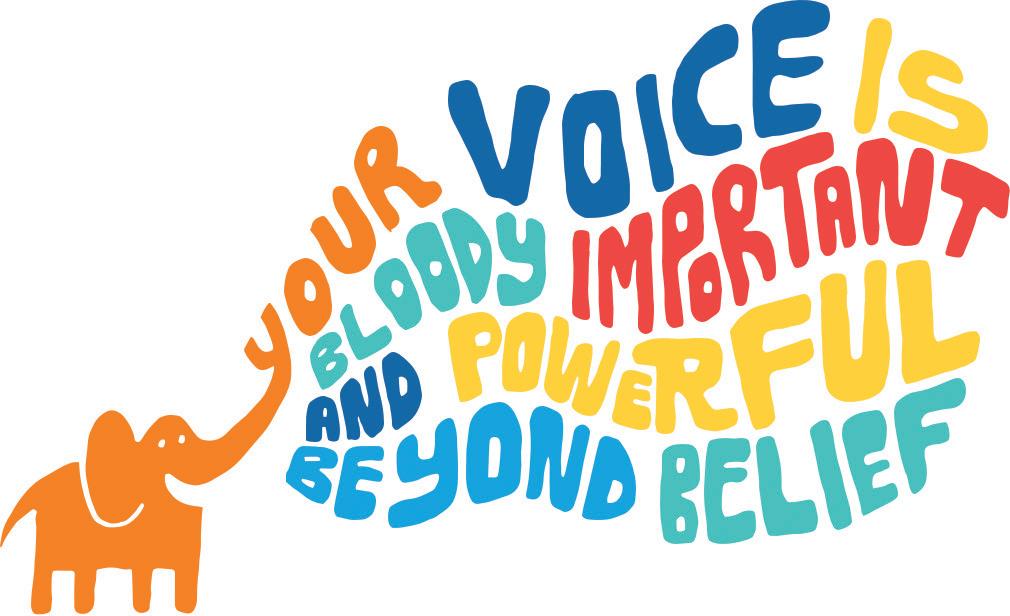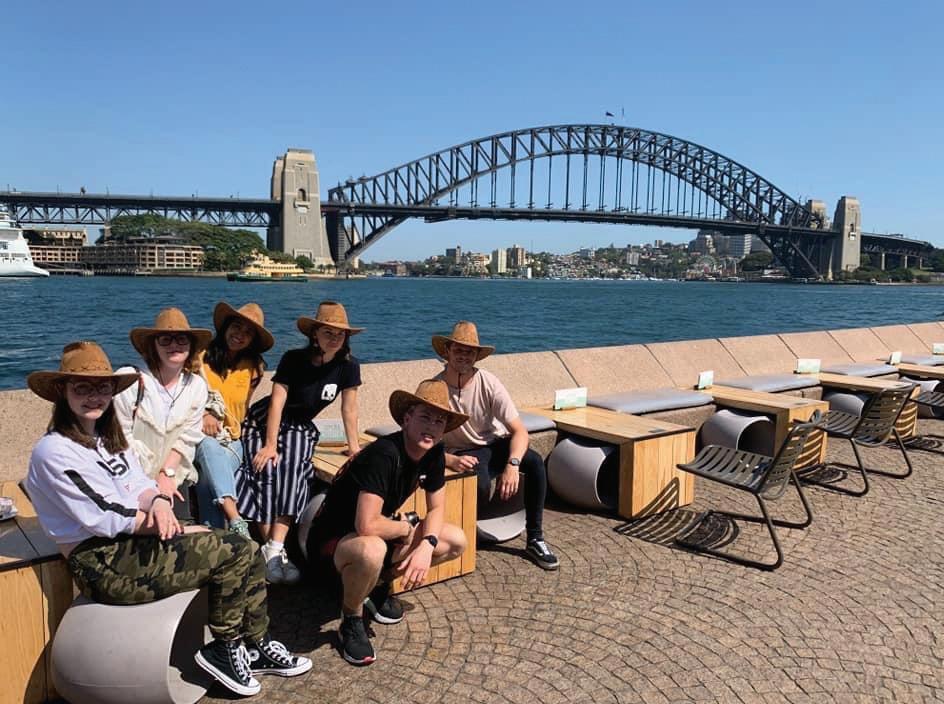
9 minute read
Interview: Caitlin O’Connor
Interview Nina Phillips Artwork supplied by batyr
In an Australian classroom of 30 students, seven will be dealing with a mental health issue, yet only two will reach out for support, leaving the other five suffering in silence. This is largely due to societal stigmas surrounding mental ill-health. Founded in 2011, batyr is a youth mental health organisation, operating nation-wide, that was named after a talking elephant in Kazakhstan. It aims to raise awareness about the “elephant in the room”— mental ill-health stigma—and empower young people to lead mentally healthy lives.
As someone who thrives helping others, undertaking a degree in social work at UniSA was the natural progression for Caitlin O’Connor following high school. Currently in her second year of university, Caitlin is the Mental Wellbeing Director of batyr UniSA. And although 2020 has thrown quite a few academic curve balls at her, she has managed to not only stay afloat during this coronavirus-riddled semester but thrive and maintain a sense of normalcy by connecting with friends and family. As borders begin to open and pubs regain the pintclinking ruckus of bevvie fiends, Caitlin believes in the importance of finding quality self-care strategies and strengthening connections with those closest.
Verse caught up with Caitlin to discuss how the COVID-19 pandemic has shaped her year thus far and efforts batyr UniSA have taken to operate as a team, albeit online.
Caitlin O’Connor

Can you tell us about yourself: Where did you grow up? What are you studying at uni?
What made you decide to study social work?
How have you found the online classes this semester?
Looking forward to going back on campus?
How and why did you get involved in batyr?
Can you tell me more about the organisation?
And it operates nation-wide?
What’s your role?
Was it difficult to adapt to the online format?
I grew up in a small, quiet suburb by the beach. It’s awesome! I’ve got a little pub and a café on my street, which is great. Yeah, I don’t really want to live anywhere else right now. I’m in my second year of a Bachelor of Social Work at the moment. I’m minoring in children, families and society. I’m loving it. I’ve met so many really cool people, I’m learning something new every day and it’s really shaped me into who I am today—without sounding too cheesy.
I actually went to see a social worker a couple years ago, at Headspace. She was super amazing, so warm and attentive. I felt really listened to and heard, and thought, “I’d love to help other people feel like this”. I’ve always been interested in mental health and wellbeing too, so I thought I’d just give it a go.
It’s okay. It took me a while to get the hang of it. Once I did, I think I adapted to it quite well. My tutors were really great, and all my classes remained interactive. But it took a lot of motivation to keep going. There’s lots of distractions at home.
Oh, definitely!
Last year, I went to a career advisor at UniSA. I wasn’t sure what kind of volunteer opportunities I should be looking at to “enhance” my career opportunities and she suggested batyr. I hadn’t heard of them before, but I applied for the 2020 student exec and got an interview. I wasn’t expecting anything out of it. I thought I was so out of my depth. I was super anxious about it and nearly didn’t go, but I’m so glad I did. I’m learning so much from being in batyr. It’s a great organisation and team environment.
We’re a group that aims to promote positive, safe and healthy conversations around mental health. We promote services such as Head Space, Beyond Blue and UniSA support services. So, we’re not a “service” per se ourselves. We’re just there to let students know that different mental health services exist and it’s totally okay to use them. And that it’s okay not to feel okay. Yeah, creating a space for students to talk about [mental health], comfortably and safely.
Yeah, there’s student executives all over, not just at UniSA. We operate nationally from Sydney and provide workshops for people that, I guess, want to be heard— who need guidance and support on where and how to get help. The Being Heard workshops empower people. Then there’s the Being Heard Pathways workshop— they’ve just introduced it. It’s for young people that are unemployed and maybe haven’t finished school. They’re both normally in-person but are now online.
Originally, I was the Volunteer and Engagement Director. My job was to engage students with batyr on campus, through on-campus events, and to get volunteers to help with these events. Yeah, helping to plan events and of course, being an on-campus advocate for mental health. But since everything became digital, we developed new roles. At the moment, I’m the Mental Wellbeing Director. So, all of the mental health and wellbeing content on our social media, that’s content I come up with. We’re also doing digital events now. We ran one about a month ago, the Feast of Strangers. At the moment we’re posting content about exam stress.
Yeah, it was actually. It’s been really difficult to figure out how to engage students online. We have an event coming up for O-Week for study period 5 so we’re trying to figure out how to engage students who, not only may never have been to UniSA before, but may never have heard of batyr before. So, it’s about putting ourselves in new students shoes and figuring out what they might want.

What’s been the most rewarding thing you’ve experienced so far with batyr?
How are you keeping connected with other exec members?
Would you say those different interactions are silver linings of working online?
And how are you practicing self-care during this time?
How are you seeing this pandemic impacting other students?
Any advice for someone who’s struggling to find that sense of routine?
For our taboo column this edition we’re talking about stigmas around men’s mental health. Could you speak to this topic a little bit?
I think, with the whole COVID-19 isolating, it’s been really hard on everyone individually as well. Watching other exec members going through it and not being able to give them a hug or anything. We’ve really been there for each other and acted as support systems while we’ve been operating digitally.
Definitely us growing as a team. It’s been challenging, having to operate digitally, but we’ve come together. our friendships have really grown. And through something so strange and unexpected! I think it’s the teamwork.
We run our meetings through Zoom now, which has been different. We play Jackbox games sometimes and we’ve always had Slack and a group chat on Facebook. It’s been kind of fun to find new ways to interact.
Totally, social media is great for this kind of stuff. I’ve also discovered a new outlet. Canva—we use it a lot to develop our social media posts, but I’ve not been comfortable using it. I’m not a design person at all. But I’ve had the time to learn and be creative.
I’m really family-oriented. So, for me, it’s all about making time to see with family and friends and keeping in contact with them. I also love—random—but I also love cleaning. I think now is the really perfect time to clean, so I’ve been doing a heap of cleaning and organising, things like that. I’ve been doing Pilates a lot as well, which is nice. Just trying to tap into things as much as I can that I was doing before. Keeping that little bit of normalcy.
It’s been really subtle, I think. I went out to lunch with a friend who studies with me the other day and she was saying, “you know, I don’t actually know of any good selfcare strategies”. There’s all this buzz about self-care and implementing it into your life, but she hasn’t really found anything practical or relevant to her. Some people aren’t exactly sure of how best to take care of themselves. This is something that we’ve been focusing at batyr. Like last month, with our Insta takeover of the UniSA Instagram page.
At the moment, re-integration anxiety back into our social lives is a little bit daunting too. I know I’m feeling that. We’ve been hibernating for four months and now we’re expected to jump back into this new norm. It’s a little bit still unknown. Maybe we need to focus on some ways to manage that stress and anxiety, return to our daily routines.
Try and write things down. Make lists at the beginning of each day. I find having a visual of what I need to do or what study I need to get done really helps to deescalate stress and anxiety. I think writing down a list or even drawing it at the beginning of each day or week, whatever works best for you, is a really non-timeconsuming way to get on top of things early.
I recently attended a suicide prevention summit and they spoke on this topic. They said the first thing we need to do is to rid the stigma that men don’t seek help. They absolutely do. Men are seeking help, but they’re slipping through the cracks. There’s research that suggests we don’t necessarily need more mental health services either. We just need better equipped services and clinicians. And we need to start acknowledging and normalising conversation around mental health and physical warning signs. That’s the number one thing: awareness.
But I think we also need to be sensitive about what mental ill health means for transgender men, gay man, men with disabilities, indigenous men, men of other cultures, and not just that straight white man we think of when we think of treating mental illness in men. We need to have more of an intersectional approach.
Are conversations around intersectionality in mental health becoming more common?
What’s next for batyr UniSA?
Totally. Anxiety, depression or feeling down—it’s not the same for anyone. No matter how you identify. But cultural factors do have a role in defining what mental health means for an individual. It’s definitely something that needs to be incorporated into treatment as more of a collaborative process and less of a top-down “I know what you need” type stance.
At the moment we’re focussing on the O-Week event for students starting midyear. We’re unsure at the moment whether that’ll be online or in-person, but definitely keep an eye on our social media to find out more about it. We’ll be posting about it soon. We also post on there when we’re looking for volunteers. RUOK Day is coming up as well, so definitely check-in with us via Instagram or Facebook.
Support batyr UniSA via their social medias. Instagram: @batyr.unisa Facebook: @batyrUniSA











